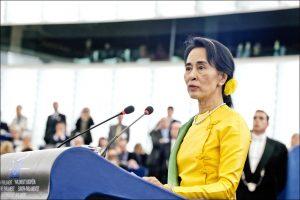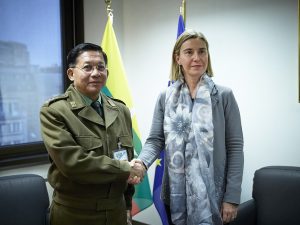By guest contributors Namrata Rawat* and Rishav Devrani.*

February 1, 2021, the world witnessed Myanmar succumbing to a military coup after a 5-year run of a democratically elected government. The coup happened on account of alleged fraud in the 2020 elections wherein the National League for Democracy (NLD) Party, headed by Aung San Suu Kyi saw a landslide victory with 83% votes in its favour. Myanmar, currently under a year-long state of emergency, would be under military rule. The coup d’état has been condemned by countries and international organisations across the globe, who have called it a serious blow to democratic reforms. However, this state of events is not unprecedented, a similar narrative presided over the 1990 election as well. The imposed state of emergency is provided for under Section 417 of the Constitution of Myanmar. It becomes pertinent to discuss this as a military rule can have unavoidable violations of human rights across the country. In this article, the authors have endeavoured to elaborate upon the constitutional roots of the emergency. The focus is mainly on the civil and political rights of the detained leaders and citizens of the country.
Military oversight under the Burmese Constitution
Section 20(e) provides the Defence Services’ responsibility for “safeguarding the non-disintegration of the Burmese Union, National Solidarity, and the perpetuation of sovereignty.” Interestingly, the Services are also responsible for safeguarding the Constitution under Section 20(f); hence, 25 percent of the Parliamentary seats are reserved for the military (Section 14 and allied provisions) which then wields its supreme veto power, since under Section 436, any amendments to the Constitution require the approval of more than 75 percent of the Parliamentarians.

This conferment of exclusive power to unelected military representatives comes as no surprise since the Constitution had been carefully drafted by the military junta in 2008 at the threshold of the transition of power. The Draft Constitution which came into being after decades of civil struggle (marked by the 88 Generations Students protests and the Saffron Revolution in 2007) and political unrest, was heavily lopsided. The State Peace and Developmental Council (SPDC, then ruling military regime) had hand-picked members of the Commission for Drafting the State Constitution. Independent parties like the NLD were kept out of the drafting process. This was to be followed by a referendum on the Draft Constitution in May 2008 which was not monitored by any independent local or international monitoring organisation. In the days leading up to the referendum, the nation’s military-controlled press touted the pro-referendum dialogue while several NLD members and peaceful protestors urging the public to vote for ‘No’ were detained. Thus, it is imperative to realise that Tatmadaw’s (Myanmar Armed Forces) withdrawal from the political front and the titular transition in Myanmar towards democracy came from a position of strength, and as noted by some scholars, implied the “institutionalisation of military dominance.”
Recognising this, the NLD in February 2019, proposed certain amendments, under an ambitious yet unsuccessful attempt, to curtail the military’s oversight in the Parliament. One of these included replacing the approval rate required to pass charter amendments to “two-thirds of elected representatives,” to the exclusion of military appointees. Another failed proposal was regarding the gradual decrease in the percentage of seats reserved for the military personnel to 15 percent after the 2020 election, 10 percent after 2025, and 5 percent after 2030.
Legal Provisions vis-à-vis the Coup
The military has defended the coup under its Constitutional responsibility to safeguard the Constitution, as discussed above. Section 40(c) allows the Commander-in-Chief of the Defence Services to “take over and exercise State sovereign power,” in accordance with the Constitutional provisions, when an emergency arises. The emergency situation referred under Section 40(c) is one which could cause “disintegration of the Union, disintegration of national solidarity and loss of sovereign power or attempts therefore by wrongful forcible means such as insurgency or violence”. In the present context, Section 417 has been invoked. It deals with the pronouncement of a year-long state of emergency, when a situation arises or is sufficiently reasoned to arise, which “may disintegrate the Union or disintegrate national solidarity or that may cause the loss of sovereignty.” However, only a President can declare such an emergency, after coordinating with the National Defence and Security Council. In the events that transpired on 1st February, the President, Win Myint, was detained, along with other NLD leaders. Myint Swe, the army-nominated Vice President, was designated as the Acting President by the military, and his signatures were taken on the emergency declaration. Thereby, conferring powers on Sr. Gen. Min Aung Hlaing, the Commander-in-Chief of Defence Services.
Human Rights Concerns
Section 354 of the Constitution provides citizens a fundamental right to “(a) to express and publish freely their convictions and opinions; (b) to assemble peacefully without arms and holding procession.” However, the reality stands in stark contrast to the rights guaranteed to the citizens. People across Myanmar have taken to the streets to protest and express their discontentment with the military rule. Where the protests have been peaceful, the military has retorted with violence. Initiated with internet shutdowns, the military has now begun cracking down on the peaceful protestors using tear gas, bullets, and grenades which has led to numerous deaths. While the protestors are unfazed and have undertaken innovative methods to peacefully deter the military troops [Read: Htamein (Sarong) movement], their fight for their democratic, political, and civil rights still persists. Nevertheless, it is not only the military rule that people need to dissent against but also their biased Constitution; that under Section 420 in case of a state of emergency, bestows upon the Commander-in-Chief of the Defence Services, the right to restrict or suspend the fundamental rights of the citizens.
The arbitrary detention of the State Counselor and other political figures stands in contravention of general principle number 12 of the ASEAN Human Rights Declaration, of which Myanmar is a member. Article 9 of the Universal Declaration of Human Rights also forbids such indefinite detention. Article 9 of the International Covenant on Civil and Political Rights also condemns it, however, Myanmar has neither signed nor ratified this convention. Numerous other political and civil rights of the people have also been curtailed.
While protests have intensified in the country, the future of Myanmar’s democracy still floats on ambiguous waters withstanding its long history of military rule. This poses a question upon the international relations of Myanmar. Furthermore, it makes a case for denunciating the viability of such constitutional provisions in the 21st century.
*Namrata Rawat- Namrata Rawat is a 4th-year law student at Rajiv Gandhi National University of Law, Punjab, specialising in Criminal Law. She has a keen interest in Human Rights, Public Policy, International Taxation and Environmental laws.
Photos
“Burma 200m” by Jim Rees is licensed under CC BY-NC-SA 2.0
“Aung San Suu Kyi addressing the members at the European Parliament” by European Parliament is licensed under CC BY-NC-ND 2.0
“Federica Mogherini receives Senior General Min Aung Hlaing, Myanmar’s Commander in Chief” by European External Action Service – EEAS is licensed under CC BY-NC 2.0
“Free Burma Demonstration Amsterdam” by Franz & P is licensed under CC BY 2.0

